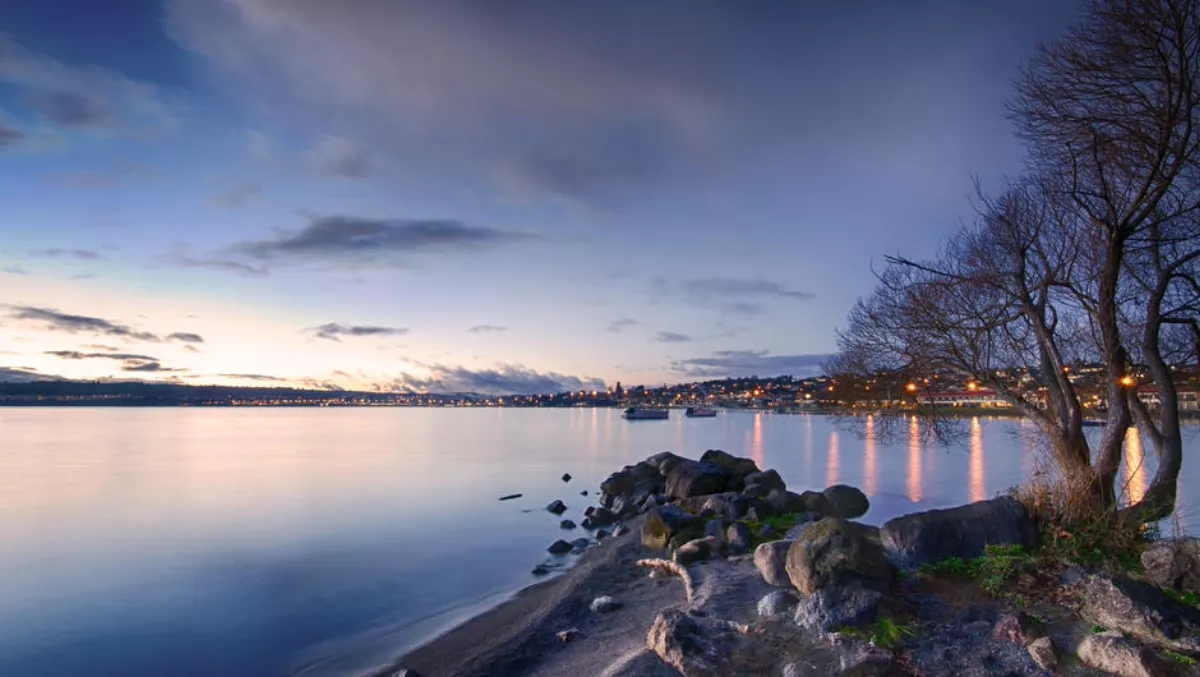
Taupō talks tech: The local Kiwi firms transforming business from the ground up
Digital transformation isn't just a buzzword drummed up by well-resourced corporates in the world's biggest cities – it is very much alive and well in even New Zealand's smaller communities.
I went along to Tech Talk Taupō, a local initiative run by Enterprise Great Lake Taupo as part of Techweek '18. The event attracted a full house, even on what was a bitterly cold night.
Tech Talk Taupō featured eight local speakers, who discussed everything from mobile connectivity and IoT on the farm, to EVs, futurism, and innovation on New Zealand's skifields.
The audience was taken From New Zealand's farming heartland to the mountains and to the cloud; Taupō's regional businesses are embracing technology from the ground up.
MCed by Enterprise Great Lake Taupo board member Murray McCaw, the event opened with a video summarising the change that digital transformation brings: quantum computing, big data, and artificial intelligence.
"Technology represents the 'how' of change', humans represent the 'why'.
Unison customer solutions manager Nigel PurdyPurdy spoke about the history of electric vehicles, how they have diverged to become niche (for example, the E-type Jaguar) and mainstream (Tesla). He also ran through the pros and cons of EVs such as emissions and efficiency, when compared to regular vehicles.
So far there are 100 fast chargers across New Zealand, including six that Unison has installed throughout Waikato, the Bay of Plenty and Hawke's Bay. He closed by referencing the future – could we be looking at a world of autonomous vehicles?
Miraka general manager of milk supply Grant JacksonJackson works in the heart of New Zealand's dairy farming and agribusiness industry. He showed how farmers are now using apps and data analytics for everything from milk collection results, milk vat monitoring, stockwater and fuel tank levels, and even automated plants.
Some farmers use drones to conduct flybys of pasture and stock. Miraka leverages mobile cloud to make all of this possible right now – but could the future lie in satellite monitoring?
Ruapehu Alpine Lifts marketing manager Matt McIvorMcIvor took the audience of a journey of "innovation on the mountain". Skiers on the popular Whakapapa and Turoa skifields use RFID cards to enter ski areas. The company is also using start-of-the-art snow technology to create snow year-round – and even to locations such as Auckland.
McIvor said Ruapehu Alpine Lifts is taking a mobile-first strategy and integrating social media into its business. It offers GPS safety and lesson tracking for children; and it's looking into how it can use VR and 360 cams to create an immersive experience for snow-lovers, no matter where they are.
Marcomms/Bellwether's Philip ElliottElliott talked about how businesses must 'fail fast' – because being slow to fail will cost you. His company Bellwether learned this the hard way when it failed to build a successful business for innovation – at least the first time around. Bellwether is now designed to provide 'people counters', while Marcomm provides software analytics for sectors including retail.
He candidly spoke about how New Zealand traditionally isn't great at building hardware, which is why software became the company's primary driver.
He spoke about keeping staff head counts down and manageable. "Employment is important for economies, but so is profitability.
Future Humans Lab's Adnan BelushiBelushi, from Taranaki-based Future Humans Lab, discussed the future of human work – with smart cities and EdTech becoming commonplace, we can also expect to see machine intelligence that enhances human ability. He remarked on China's 'social scoring' initiative that…
He concluded by describing Future Humans Lab as a firm that works with businesses to make ethical decisions about human work.
Spidertracks sales director / entrepreneur, engineer, and angel investor Bruce BartleyHe is currently involved in Spidertracks, an aircraft GPS tracking system that started as a rescue beacon for helicopters. Customers started using it as a private radar, so it evolved into a product that brings in $10m revenue from 5500 units worldwide.
He also invested in Eye-Fly, a cloud-based Software-as-a-Service (SaaS) that provides immersive video footage to the country's tourism industry such as helicopter, whitewater rafting, and jet boat tours.
Bay of Plenty Regional Film Office's Anton SteelSteel discussed sustainability and fulfilment in the regional film, and the future of the film industry.
Kloud Collective director John CurtisKloud Collective is a co-working space in the heart of Taupō. He concluded the event with a futuristic view of how robots, AI and superintelligence will shape the world.
He explained that AI will form the future of facial recognition (buy a hoodie to hide your face, he warns).
He believes AI will be great for humanity and it's only a natural evolution to see silicon and fibre optics as commonplace in our future.
He explained the case of 'Move 37' in the AlphaGo vs Lee Sedol match, also known as the Google DeepMind Challenge Match. The AI made a move that no human could ever have suspected. While the commentators were puzzled at first, they soon named it a 'beautiful' move.
So with AI rapidly surpassing our current capabilities, what does that mean for the real world?
Technological advances must not be left to be privatised and controlled – they must be controlled by us all.


